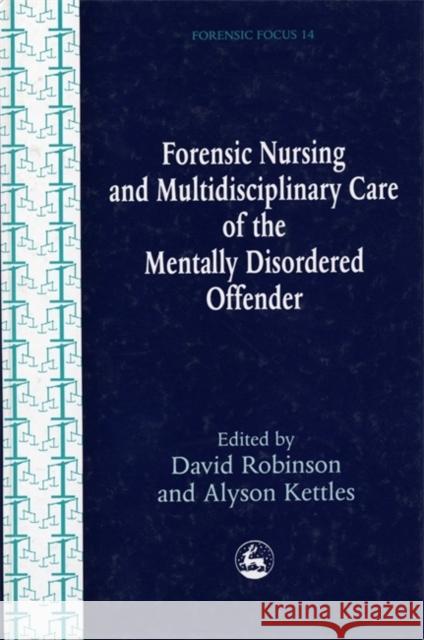Forensic Nursing and Multidisciplinary Care of the Mentally Disordered Offender » książka
Forensic Nursing and Multidisciplinary Care of the Mentally Disordered Offender
ISBN-13: 9781853027543 / Angielski / Miękka / 1999 / 250 str.
This book is unique in attempting to examine the role of the professional forensic nurse and explore the multi-professional boundaries within mental health. Its contents provide an insight into the cross-cultural thinking and the complexities and conflict of the forensic nurse. It attempts to define this complex role within mainstream psychiatric nursing and puts forward strong arguments that forensic nurses require different and advanced nursing skills ... Using empirical data, the contributors within the book have provided a strong platform in promoting a better understanding of Forensic Nursing, both nationally and internationally. The issues of training and multi-professional collaboration remains central to the care for the mentally disordered offenders. This book is highly recommended to all health care practitioners involved in the field of forensic medicine.' - Journal of Psychiatric and Mental Health Nursing Robinson and Kettles have assembled a collection of 20 articles on the subject, conveying the perspectives of 30 contributors from seven countries and offering theoretical views, as well as practical consideration. There is also an extensive section of related references included in the book ...Nurses interested in better understanding this emerging field, as well as mental health nurses desiring some provocative cross-cultural comparisons of practice, will find this book of value.' - Proquest ...the book does provide a thorough analysis of the essence of mental health care and and would be an excellent introductory text for students on the secondment to forensic units or anyone working in the field for the first time.' -Therapeutic Communities. ...where it differs from other forensic texts that have been published recently, and this is a key strength in the text, is that the chapter authors have approached the issue from a range of professional backgrounds. Neither is the text confined to what is currently happening in the UK, it updates the reader on forensic work in the Netherlands, Australia, Canada and USA, Norway and Germany.' I recommend this text, not only as in introductory guide for students, but also for those in forensic services keen to develop their knowledge of multi professional working on a national and international basis'. -The British Journal of Forensic Practice This book is the first to attempt to capture the essence of forensic nursing practice. The issues it examines include: whether forensic nursing should be a separate specialty, what its content should be; training and education; areas of practice; and practitioners' experiences. International perspectives of forensic nursing are well articulated. The book highlights important research questions and outlines fundamental prerequisites for postbasic training and education. Overall, a valuable source for this much-needed discipline.' - Nursing Times '...where it differs from other forensic texts that have been published recently, and this is a key strength of the text, is that the chapter authors have approached the issue from a range of professional backgrounds. Neither is the text confined to what is currently happening in the UK, it updates the reader on forensic work in the Netherlands, Australia, Canada, the USA, Norway and Germany. ... I recommend this text, not only as in introductory guide for students, but also for those in forensic services keen to develop their knowledge of multi professional working on a national and international basis.' - The British Journal of Forensic Practice The first comprehensive account of forensic nursing and its role within the wider professional team, the aim of this book is to provide a multidisciplinary perspective on the training needed to work with mentally disordered patients, as well as to examine the key characteristics of the forensic nursing role. An international group of contributors, from a wide range of disciplines, provides a well-rounded, comparative view of the forensic nursing profession. The chapters are a rich contribution of cross-cultural thinking on the many dilemmas and challenges facing nurses, psychiatrists, psychologists and other health care practitioners, working with specific client groups. Each contributor has utilised empirical data to analyse relevant issues, such as: professional standards; effectiveness of preparation for nurses working within secure environments; day to day and long term challenges facing nurses; clinical effectiveness; the dilemma of security versus practice; how forensic nursing differs from other kinds of nursing; and what forensic nurses can contribute to other mental health care disciplines. Examples of how research findings may be integrated into practice, will be of interest not only to forensic nurses, but also to significant sectors of the mental health care field.











